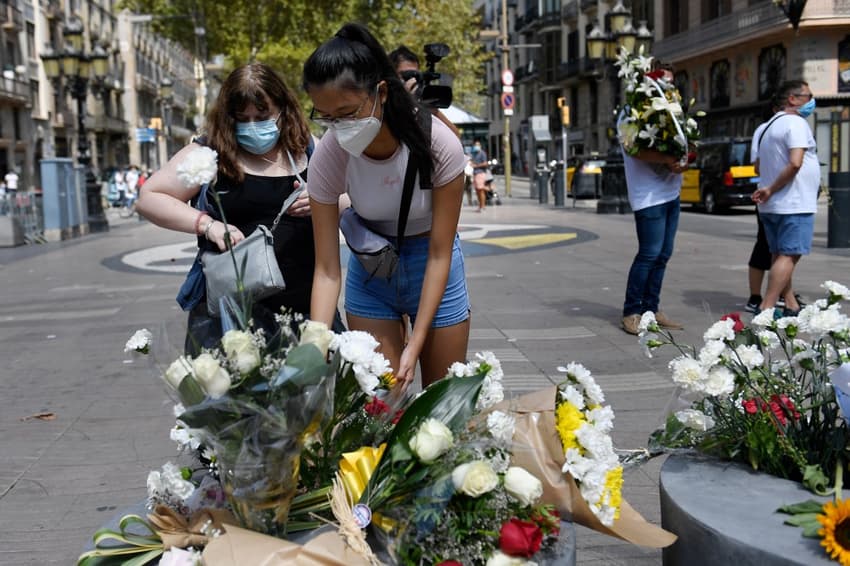Spain marks third anniversary of deadly Catalonia attacks

A ceremony was held in Barcelona on Monday in memory of the 16 people who died during attacks in the Spanish city and a
nearby resort three years ago.
Wearing face masks and maintaining social distance because of the pandemic, dozens of relatives of the victims laid white carnations on the famous Las Ramblas boulevard where on August 17, 2017 a van mowed down pedestrians leaving behind a trail of bodies.

Health Minister Salvador Illa and the president of the regional government of Catalonia, Quim Torra, were also in attendance.
Hoy, hace tres años, la barbarie, el horror y el sinsentido del terrorismo golpearon #Cataluña.
Hoy, tres años después, las víctimas de los atentados de #Barcelona y de #Cambrils siguen en nuestra memoria.#17A pic.twitter.com/29czq1vSF6
— PSOE (@PSOE) August 17, 2020
Claimed by the Islamic State group, the attacks were carried out by a cell made up mostly of young people of Moroccan descent who grew up in Catalonia.
Avui hem recordat les víctimes dels atemptats del #17A i hem acompanyat les seves famílies amb un minut de silenci i una ofrena floral al Pla de l'Ós de la Rambla de Barcelona. pic.twitter.com/X8vtaJmHKY
— Meritxell Batet (@meritxell_batet) August 17, 2020
Younes Abouyaaqoub drove the van down Las Ramblas at high speed before fleeing in a car he stole after killing the driver. Abouyaaqoub, 22, was shot dead by police four days later.
Several hours after the attack, five of his accomplices drove into more pedestrians and stabbed a woman who later died of her injuries in Cambrils, a seaside resort 100 kilometres (60 miles) to the south. All five were shot dead by police.
Spanish prosecutors are seeking prison terms of up to 41 years for three men over their involvement in the 2017 attacks, which also injured 140 people.
The cell had been planning attacks on a grand scale involving explosives, with sites such as the Eiffel Tower in Paris and the stadiums of Barcelona and Real Madrid football clubs among alleged targets.
But the accidental explosion of its arsenal in Spain -- which killed the suspected leader of the cell -- pushed the group to hurriedly improvise the two attacks in Catalonia.
Comments
See Also
Wearing face masks and maintaining social distance because of the pandemic, dozens of relatives of the victims laid white carnations on the famous Las Ramblas boulevard where on August 17, 2017 a van mowed down pedestrians leaving behind a trail of bodies.

Health Minister Salvador Illa and the president of the regional government of Catalonia, Quim Torra, were also in attendance.
Hoy, hace tres años, la barbarie, el horror y el sinsentido del terrorismo golpearon #Cataluña.
— PSOE (@PSOE) August 17, 2020
Hoy, tres años después, las víctimas de los atentados de #Barcelona y de #Cambrils siguen en nuestra memoria.#17A pic.twitter.com/29czq1vSF6
Claimed by the Islamic State group, the attacks were carried out by a cell made up mostly of young people of Moroccan descent who grew up in Catalonia.
Avui hem recordat les víctimes dels atemptats del #17A i hem acompanyat les seves famílies amb un minut de silenci i una ofrena floral al Pla de l'Ós de la Rambla de Barcelona. pic.twitter.com/X8vtaJmHKY
— Meritxell Batet (@meritxell_batet) August 17, 2020
Younes Abouyaaqoub drove the van down Las Ramblas at high speed before fleeing in a car he stole after killing the driver. Abouyaaqoub, 22, was shot dead by police four days later.
Several hours after the attack, five of his accomplices drove into more pedestrians and stabbed a woman who later died of her injuries in Cambrils, a seaside resort 100 kilometres (60 miles) to the south. All five were shot dead by police.
Spanish prosecutors are seeking prison terms of up to 41 years for three men over their involvement in the 2017 attacks, which also injured 140 people.
The cell had been planning attacks on a grand scale involving explosives, with sites such as the Eiffel Tower in Paris and the stadiums of Barcelona and Real Madrid football clubs among alleged targets.
But the accidental explosion of its arsenal in Spain -- which killed the suspected leader of the cell -- pushed the group to hurriedly improvise the two attacks in Catalonia.
Join the conversation in our comments section below. Share your own views and experience and if you have a question or suggestion for our journalists then email us at [email protected].
Please keep comments civil, constructive and on topic – and make sure to read our terms of use before getting involved.
Please log in here to leave a comment.